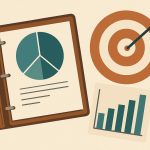Maintaining your financial health isn’t something that happens overnight. It’s more like taking care of your body—slow, consistent actions over time lead to better results. Whether you’re dealing with the ups and downs of daily expenses, trying to save for an emergency, or managing debt, taking small, deliberate steps toward financial stability is key. It’s easy to get caught up in the day-to-day, but looking at the bigger picture and making smart decisions will help keep your finances in good shape in the long run.
In this article, we’ll answer the question, “What is debt settlement,” cover how to maintain your financial health by building savings, managing debt, and making mindful borrowing decisions. By the end, you’ll have actionable steps to feel more financially stable and prepared for whatever comes your way.
Start with Building Emergency Savings
One of the first steps to maintaining financial health is creating an emergency fund. Life is full of surprises, and having savings set aside can provide peace of mind when things don’t go according to plan. Aim to build enough savings to cover at least three months of essential expenses, including rent, utilities, groceries, and transportation. This cushion will help you avoid falling into debt if an unexpected event happens, like a job loss or an emergency medical bill.
It might feel like a big goal to set aside three months of expenses, especially if you’re living paycheck to paycheck, but don’t get discouraged. Start small—put aside a small amount every week or month, and over time, that adds up. You could also consider setting up automatic transfers to your savings account, so you’re less likely to skip saving when other expenses come up.
It’s important to note that building savings can take time, so don’t feel pressured to have it all set aside immediately. Focus on making consistent progress. Remember that savings is meant to help you through emergencies, and it’s worth the effort to create that financial cushion.
Managing Debt: Take Control of Your Finances
Debt can feel like an overwhelming burden, but there are ways to take control and manage it effectively. The first step is to acknowledge how much you owe, understand the interest rates, and create a plan to pay it down. The goal should always be to borrow only what you can reasonably afford to pay back. Whether it’s credit card debt, personal loans, or other forms of borrowing, it’s essential to borrow wisely.
If you already have debt, there are several strategies you can use to manage it. One common approach is debt consolidation, where you combine multiple debts into a single loan, often with a lower interest rate. This can make it easier to manage your payments and potentially reduce the amount of interest you’re paying over time. However, it’s important to ensure that consolidating your debt doesn’t come with high fees or new terms that leave you worse off than before.
Another option is to look into what is debt settlement. Debt settlement is a process where you negotiate with your creditors to pay off a portion of your debt in a lump sum, which is less than the total amount owed. While this can help reduce the amount of debt you owe, it can also negatively impact your credit score, so it’s important to carefully weigh the pros and cons before pursuing this option.
The key to managing debt is making payments on time, avoiding taking on new high-interest debt, and adjusting your spending habits. It may also help to approach your lender if you’re struggling to make payments. Many lenders are willing to work with borrowers to find a solution that suits both parties, such as extending payment terms or temporarily lowering interest rates.
Avoiding Unnecessary Debt
While managing the debt you already have is important, avoiding unnecessary debt is equally essential. It’s easy to fall into the trap of borrowing more than you need, especially when using credit cards or taking out loans. One of the best things you can do for your financial health is to borrow only what you can realistically afford to repay.
Before taking on any new debt, ask yourself if it’s necessary. Is this a want or a need? Can you afford the monthly payments without sacrificing your other financial goals? If the answer is no, it’s a sign that you might want to reconsider the purchase or loan.
Also, avoid taking on debt impulsively. If you’re considering a large purchase, take some time to think it over. This will give you the chance to evaluate if it’s worth going into debt for and whether you can afford to make the payments over time. Impulse debt can easily lead to a cycle of borrowing and repayment that leaves you struggling financially.
Cutting Back on Expenses
If you’re already in debt or trying to free up more room in your budget, cutting back on non-essential expenses can help. This doesn’t mean depriving yourself of everything you enjoy, but it does mean being mindful of where your money is going. Look for areas in your budget where you can make small adjustments that will add up over time.
For example, consider reducing discretionary spending, such as dining out, subscription services, or entertainment expenses. These are areas where you might not even notice the small changes, but over time, cutting back can free up significant amounts of money. If you don’t already have one, create a budget to track your income and expenses, and see where you can make adjustments.
Additionally, find ways to save on your regular expenses. This might include shopping around for cheaper insurance rates, cutting back on utility use, or finding more affordable alternatives for everyday items. The goal is to make conscious decisions about where your money goes, so you can prioritize paying down debt and building your savings.
Building Financial Literacy for Long-Term Success
Maintaining financial health isn’t just about managing what you have now—it’s also about building knowledge for the future. Financial literacy is crucial for making smart decisions with your money and feeling confident in your financial choices. Take the time to learn about topics like budgeting, credit scores, investing, and tax planning. There are plenty of free resources online, from blogs and podcasts to videos and courses, that can help you improve your understanding of personal finance.
The more informed you are, the better equipped you’ll be to make decisions that set you up for long-term success. Whether it’s figuring out how to invest for retirement or understanding how interest rates affect your credit cards, financial education will empower you to take control of your financial future.
Final Thoughts: A Healthier Financial Future Starts Now
Maintaining your financial health is a lifelong process, but the steps you take today can lead to better financial security tomorrow. Start by building an emergency savings fund, managing your debt carefully, and borrowing wisely. Look for ways to cut back on unnecessary expenses, and make financial education a priority. By following these steps, you’ll be better equipped to navigate the ups and downs of life without feeling overwhelmed by money.
Lynn Martelli is an editor at Readability. She received her MFA in Creative Writing from Antioch University and has worked as an editor for over 10 years. Lynn has edited a wide variety of books, including fiction, non-fiction, memoirs, and more. In her free time, Lynn enjoys reading, writing, and spending time with her family and friends.















